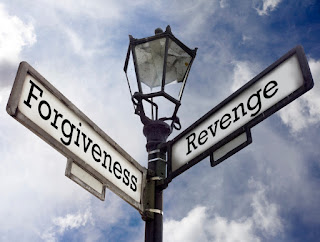Have you ever been in a situation where someone brings up your past mistakes, not to encourage you, but to make you feel inferior or unworthy? It’s painful when others try to drag us back into a past we’ve worked so hard to leave behind. It can feel like a heavy weight on your soul whether it’s a reminder of past failures, sins, or struggles. But here’s the truth: if you are in Christ, you are a new creation, and your past no longer defines you.
No matter how messy, broken, or sinful, it is not who you are anymore. When people remind you of your past to bring you down, it’s crucial to remember who God says you are, not what others say about you.
1. God Has Forgiven You
We discussed this in the previous post on forgiving yourself but let us be encouraged by God's word. The most important truth to cling to when someone tries to use your past against you is that God has already forgiven you. Psalm 103:12 says, “As far as the east is from the west, so far has He removed our transgressions from us.” If God has removed your sins and no longer holds them against you, why should you let anyone else do so?
It’s easy to feel discouraged when others try to keep us trapped in our old mistakes, but God’s forgiveness is complete. The sacrifice of Jesus on the cross was enough to cover every sin, and when you accept His forgiveness, you are free from the burden of your past. Romans 8:1 reminds us, “Therefore, there is now no condemnation for those who are in Christ Jesus.” If God does not condemn you, neither should anyone else.
2. People Will Try to Keep You in Your Past
Unfortunately, not everyone will understand or accept God's transformation in your life. Some people may try to pull you back into who you used to be, either because they refuse to see your growth or because they want to make themselves feel superior. But their opinions do not determine your worth or your identity.
In the Bible, even the apostle Paul dealt with this. Before his conversion, Paul (then Saul) was known for persecuting Christians. After his dramatic encounter with Christ, many people were skeptical of his transformation. They remembered his violent past and doubted whether he had truly changed. But Paul didn’t let their doubts stop him from embracing his new life in Christ.
In Philippians 3:13-14, Paul writes, “But this one thing I do, forgetting those things which are behind, and reaching forth unto those things which are before, 14 I press toward the mark for the prize of the high calling of God in Christ Jesus.” Paul knew he couldn’t allow his past to define him. Instead, he focused on what God had called him to do. You can do the same. People may bring up your past, but you have the power to focus on God’s future for you.
I was talking to a friend recently who told me about a meet-up he had with an old friend. It had been over a decade since they’d seen each other, and both were in completely different places in their lives. Back in the day, my friend used to smoke, party heavily, and hang around some shady people. But since then, he has turned his life around—he's now a successful businessman, married to a God-fearing woman and they have four beautiful children. He has left that lifestyle far behind.
As they caught up, the old friend kept bringing up his past, reminding him of the wild days. “Remember that night you got so drunk, you broke into your neighbor's house and stole their radio?… Now look at you, all successful and stuff!” the friend said, almost with a hint of disbelief. My friend laughed it off initially, but it became clear that his old friend wasn’t simply reminiscing. It felt more like a judgment, as if my friend’s transformation didn’t sit well with him. By the end of the conversation, my friend felt like his past was being held against him, as if his growth didn’t really matter.
As we talked, I reminded him, like I stated previously, of Philippians 3:13, where Paul says, “Forgetting what is behind and straining toward what is ahead.” His past didn’t define who he was anymore. People might bring up his old life, but God had already made him new. 2 Corinthians 5:17 reminds us, “If anyone is in Christ, he is a new creation. The old has gone, the new is here!”
Sometimes, people will remind you of your past to make you feel like you haven’t really changed or to bring you down. But remember, your past doesn’t hold power over you anymore. You are no longer defined by who you were, but by who God has made you now—a new creation, forgiven and transformed.
3. Your Identity is in Christ, Not Your Past
It is essential to remember who you are now. Ephesians 2:10 says, “For we are God’s handiwork, created in Christ Jesus to do good works, which God prepared in advance for us to do.” You are not the sum of your mistakes; you are God’s masterpiece, created for a purpose far greater than your past failures.
The enemy loves to use people to try and make us feel small, unworthy, or trapped in shame. But the Bible teaches that once we belong to Christ, we are His, and nothing can change that. 1 Peter 2:9 reminds us that we are “a chosen people, a royal priesthood, a holy nation, God’s special possession, that you may declare the praises of Him who called you out of darkness into His wonderful light.”
When others try to drag you back into the darkness of your past, remind yourself that you have been called into God’s wonderful light. Your identity is not in the things you’ve done wrong, but in the God who has redeemed you.
4. Forgive Yourself and Move Forward
The only way others can be successful at bringing you down is if you haven't fully forgiven yourself. If you find that you’re still holding onto guilt or shame from your past mistakes, take this opportunity to bring it to God and allow His grace to wash over you. Isaiah 1:18 says, “Though your sins are like scarlet, they shall be as white as snow; though they are red as crimson, they shall be like wool.”
When God forgives us, He does so completely. If you’ve repented and turned to Him, then you are washed clean. Forgive yourself, and don’t allow anyone—whether it’s others or your own inner critic—to make you feel like you’re still stained by the past.
5. Responding with Grace
When people bring up your past, it’s natural to feel defensive or hurt. But as Christians, we are called to respond with grace. Colossians 3:13 encourages us, “Bear with each other and forgive one another if any of you has a grievance against someone. Forgive as the Lord forgave you.” This doesn’t mean you have to accept harmful behavior or allow people to mistreat you, but it does mean letting go of bitterness and showing Christ’s love, even in difficult situations.
By forgiving those who try to bring you down, you free yourself from the chains of anger and resentment. More importantly, you reflect the heart of God, who forgives us endlessly despite our own shortcomings.
6. Focus on Your Future, Not Your Past
Ultimately, your past is behind you, and God has a future filled with hope and purpose for you. Jeremiah 29:11 says, “For I know the plans I have for you, declares the Lord, plans to prosper you and not to harm you, plans to give you hope and a future.” Don’t let anyone distract you from the good plans God has for you by pulling you back into a past that no longer defines you.
When people try to remind you of who you were, stand firm in the knowledge of who you are in Christ. You are forgiven, redeemed, and chosen. God has called you out of darkness and into His light, and no one has the power to take that away from you.
Walk in Freedom
People may try to bring up your past to make you feel unworthy or inferior, but their words hold no weight in light of God’s truth. You are a new creation in Christ, and your past is covered by His grace. The next time someone tries to drag you down with reminders of your mistakes, remind yourself of Romans 8:31, which says, “If God is for us, who can be against us?”
Walk in the freedom that Jesus has given you. Your past no longer has power over you, and no one can make you feel inferior when you stand firm in the knowledge of who you are in Christ. Let His grace define you, and keep pressing forward to the future He has in store.
God bless you!












